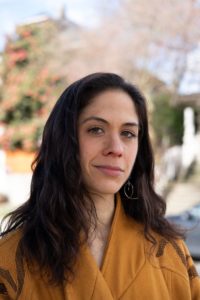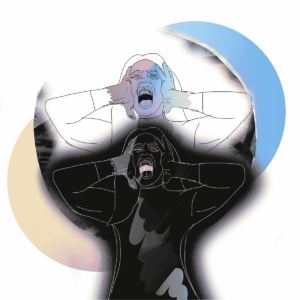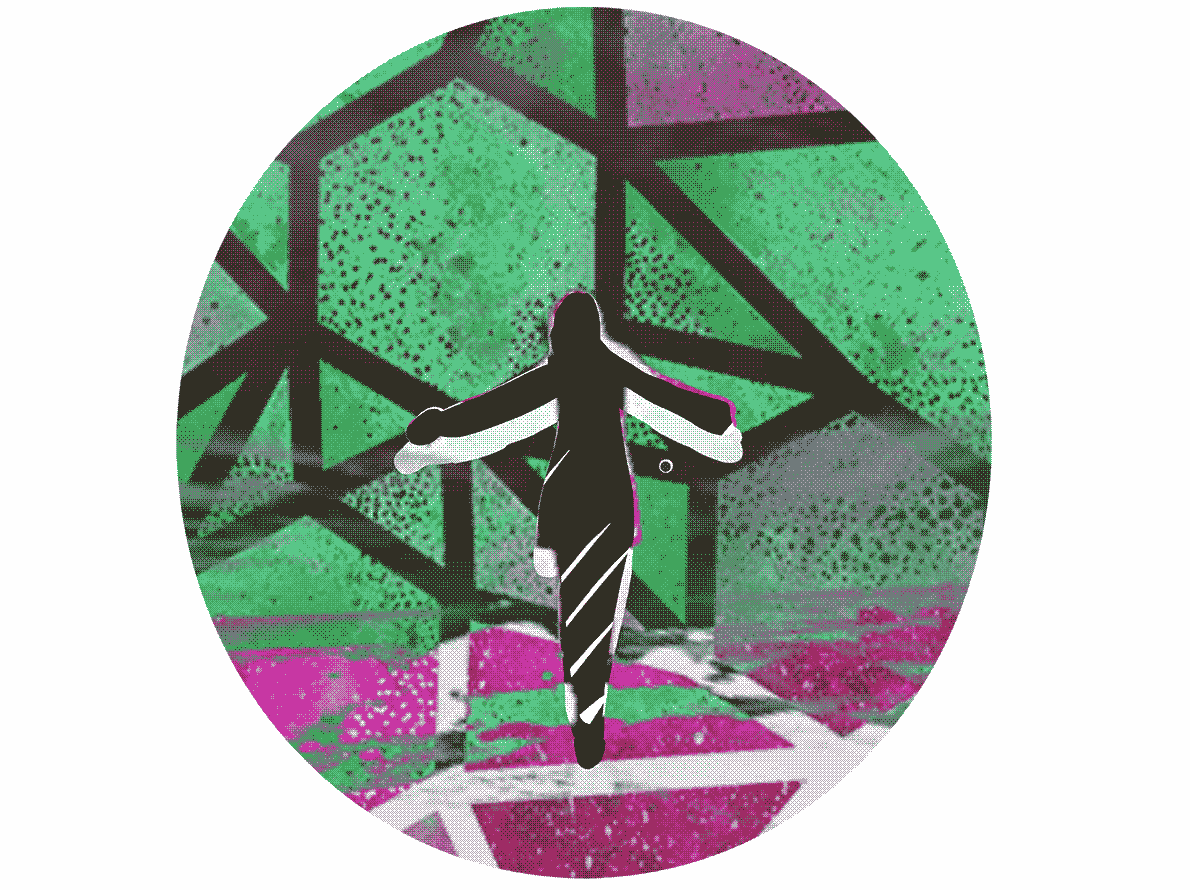[TW: Suicide]
Author, Academic, Drug User and Mad Woman Nicole Luongo critically examines our societal takes on health and illness. Fueled by lived experience, her work in what is colonially known as “Vancouver” is situated at the intersections of Madness, disability, drug policy, and housing justice. She just published her first book “The Becoming”.
Lisa: Thank you so much for talking to me. I learned about you on social media, where you say a lot of smart, nuanced, and compassionate things about not only drug use but also housing and mental health. It was then I discovered you had just published, “The Becoming,” and thought, if you wrote a book, I must read it.
Nicole: I appreciate that, and let me just preface everything I say by stating that I’m very blunt and accustomed to talking without a lot of emotions about things, like suicide. If it becomes too much just let me know.

L: Are you comfortable with giving a summary of your book?
N: It is a nonlinear narrative about going to Oxford to begin a PhD with a lot of unaddressed trauma and not just repressed experiences but also beliefs about myself and the world. After having convinced myself that this external marker of validation would solve the existential crisis that I was in, I was forced to confront very quickly that that was not the case and was subsequently being institutionalized after spending a month in an intoxicated blackout. In the hospital I had this incredibly profound experience that was the combination of many years of learning and to be cliché also unlearning. In my book I detail that, and I approach my experiences through a number of lenses.
L: Going to the UK results in a total breakdown. The university catches up after a while and puts you into a mental health facility. They pay for your stay but not for treatment. It seems like they do not really want to deal with it and neither does the staff of the facility.
N: It was — the only word I can use is — surreal. Of course, I was in an altered state, and I can’t guarantee my perception was shared by others, but I felt that I was able to express precisely what was happening. I would say to people, I’m in psychosis, and to have them tell me I wasn’t was mind-bending and indescribably frightening.
L: Writing the book feels like a necessity. You start while still being institutionalized in the UK. It seems like you’re doing it to hold on to your version of reality, but also to be able to go back and make sense of what was happening. It feels very much for you. What made you want to share it?
N: I didn’t cater to a particular audience, and I was clearly not trying to write a mainstream book. At the same time throughout my life, I almost exclusively had my realities denied and I’ve had people projecting their own narratives onto me. It felt vital to be able to have control over the narrative and it felt a bit like a ‘fuck you,’ to be honest. There are passages in there that are coming from a part of me that has never had any capacity to express herself.
L: Do you feel like it made a difference?
N: Maybe? I don’t know. My entire life I’ve felt so incredibly alienated including from myself. I really do feel as though I am kind of a ghost or a guest in this world who is not supposed to be here necessarily and so to have clear documentation of what my experience has been and to know that there will be at least some people bearing witness to that.
I think that is my attempt at connection. A very rudimentary, kind of unhinged version of it, but because I often feel so performative during interpersonal interactions, that was kind of the closest I could get to giving something of myself that was authentic, for lack of a better term.
L: I really appreciated the quote in your book: “When someone is encouraged to express themselves signs of disorder abate.” Do you think for people who are going through treatment there is genuine space for genuine expression?
N: Absolutely not, because the mental health system is so recovery oriented. I use that word very purposefully. What I mean by that is; recovery in a sense of being able to conform to societal expectations. Practitioners tend to immediately label the problem so as to create a treatment pathway to return someone to fulfilling their social roles. There’s very little room for interrogating whether fulfilling those roles — whether it be as an employee, a child, a partner, or a student — is actually contributing meaningfully to someone’s inner experience. The indicators of wellness we have as a society are so rooted in capitalist logics. I don’t think it’s nefarious on the part of practitioners, but by seeking out any treatment you are kind of a priori stating: “I want to change.” That change is almost exclusively going to look like conforming to societal expectations.
L: It felt like you developed a kind of DIY approach to understanding and helping yourself.
N: I arrived in the UK already having done a master’s degree, already having been exposed to Mad Studies, and more traditional medical sociology and sociological approaches to things like deviance. After the repeated, I will say, negligence, I was kind of forced to draw from the information that lives inside of me. I do see that as a gift in a sense, because if I had simply been validated by staff when I believed I was psychotic, I think my pathway would have been very different. It wasn’t a spontaneous thing. I’ve always lived with this tension of; I don’t subscribe to the biomedical model of mental illness, and, I’m unwell.

L: What is Mad Studies?
N: It’s a body of research and theorizing and advocacy that is now being incorporated into academia. It’s a bit unique when it comes to academic fields because it’s generally produced by and for people with lived experience. It often includes first person narratives or survivor lead research. The term ‘mad’ is a political orientation; it is a substitute or replacement for terms like mental illness and all of those very stigmatized and pathologizing terms that emerge from the mental health system. It’s a reclamation of difference while disavowing the negative connotations that necessarily come with that difference.
L: In “The Becoming” you write about experiencing a kind of rebirth — but that might also be a too personal experience to recount, and people can simply read about it…
N: It ignited a really fundamental shift, and I did stop referring to myself as being ‘psychotic’ and just began to embrace what I had known was happening all along. That this was something which the biomedical model of mental illness could not explain. Denouncing the label of psychosis for once and all was critical for that.
L: You describe the relief in your book when you first got into sociology and fully realized that there are many factors out there like class, racialization, ableism, etc. that can make people’s mental health so much worse. It broke the belief you held from childhood that it was all simply your fault. Why is it not a big part of any kind of therapy to talk about those factors?
N: I think it’s important to distinguish between systemic constraints and individual actors. There are mental health practitioners who are very aware of systems of oppression and do take pains to incorporate discussions of the social determinants of health into their practice but at the same time, the system is designed to individualize social problems and to depoliticize them. You might have a psychiatrist who says, “Yes, you’ve had a horrifically traumatic life but the only tools I have at my disposal right now are the labels of borderline personality disorder, and so even if I’m able to kind of acknowledge that environmental factors have contributed to your condition, I’m still going to place the responsibility on you. I’m still going to say you have a condition because I’m obligated to.” I think there are extreme limitations of what most people can accomplish in the mental health system alone.

L: What is your vision?
N: My utopian vision of society is one in which we have community care and non-hierarchical non-authoritarian forms of care that don’t include labels, where people’s fundamental needs are met and peers who have made the same experiences hold space for people who enter extreme altered states.
I would also like to live in a society where if you need six month or six years to just completely opt out of traditional social roles you could and you wouldn’t risk houselessness and death by virtue of that.
L: A beautiful thing about your book is that it’s kind of a love letter to your peers. What you went through sounds so lonely, and they are the ones who provide companionship, unlike the mental health professionals.
N: That distinction was so stark. I interpreted staff members and people who had authority as menacing and terrifying just energetically. Whereas, my peers were this well of comfort. Again, my experience was a very extreme version of that, but I think we can see that reflected in the broader society as well. Even the DTES — having been homeless there myself. Unless you’ve been truly through an experience and are now in a position to support someone else without having power over them — that’s a key factor — I don’t think you can really support someone. Professional roles enforce differences. Someone goes to work, and even if they truly care for the people, that changes how they carry themselves and what their concerns are.
L: My experiences are limited but I don’t feel like we truly acknowledge the importance and role of peers in the mental health sector.
N: This is true both of the mental health system and around drug use, where peers have historically played this kind of radical role. Networks of peers often emerge organically; they are able to emphasize in ways that others can’t, and they aren’t obligated to reinforce the system.
L: Whenever you describe your experiences it just all sounds so harmful and unsafe. I understand that it’s probably very hard to create safety for someone experiencing these states, but still…
N: When it comes to acute crises, when it comes to altered states, I believe that the best and only thing that should be done is to let people express what they need to express. The mental health system is very concerned with reorienting people to consensus reality. When someone is hearing voices, for example, the kind of immediate impetus is to correct them. To diagnose and suppress their symptoms, even when we know that if someone is experiencing something which others aren’t — it’s usually meaningful. Hallucinations and delusions aren’t random, and I think the only way to move someone through a state like that successfully is to validate them even if you don’t share that reality. It’s incredibly important to just hold space for people’s states, whether it’s screaming or weeping, and not try to make sense of it through language.
L: What I found interesting in your book is that it almost seems like drugs or alcohol aren’t just harm reduction — it’s like a tool to liberate yourself from the molds you’ve been pressed into. You are very honest about how incredibly harmful it becomes for you, but at the same time, you describe what a relief ‘bulimic alcoholic Nicole’ is to the former versions of yourself.
N: I’m very clear in the book about the polarity of my existence. I moved through the world feeling as if I am performing constantly, whether you want to attribute that to neurodivergence, or madness, disability, or just trauma. It is very challenging for me to maintain an air of adult respectability. It feels very disingenuous. The opposite of that is permitting myself to drop the mask and cease to perform — which, for me, looks like an eruption of alcohol and crack-fueled benders and extreme erraticism. It quickly leads to not being housed, and with that, also comes a lack of societal expectations, right?
And again, I’m very careful with how I use the word authentic in my book — and I kind of problematize that — but it feels very cathartic to not have this societal perception that I am a competent, functioning, stable adult, because that is not my inner experience. While sober, I’m still too concerned with how others perceive me to truly express that rage and grief. And of course, we don’t have systems in place to support an expression that would be deemed healthier. We don’t have systems in place to catch people before their entire world unravels.

L: You work in drug policy. If you had to summon up the decriminalization of drugs, what would it solve?
N: Fundamentally decriminalization is not sufficient because it does not address the volatility and toxicity of the illegal drug market. It still allows police to have jurisdiction over what they enforce, so you still see visibly poor and racialized people being disproportionately impacted by police violence. It still drives drug use underground. The actual policy solution that I’m advocating for is legal regulation, which means that not just all criminal penalties get removed, but there is also a predictable supply of drugs one can access without having to be diagnosed as having a severe, treatment resistant ‘substance use disorder — and all the forms of control that come with that.
L: Would it have reduced the harm that you’ve experienced?
N: The implications of it would have been huge. For me personally, it’s not just that having a legal supply of drugs would have made a difference, it’s that legalizing drugs would indicate that we, as a society, are a bit more willing to embrace differences. And that is kind of the crux […] there is no real, meaningful accommodation of significant difference.
L: How would you phrase ‘a substance abuse problem,’ or what would you wish for people to understand?
N:I don’t like the term addiction. I don’t like ‘substance-use disorder’ either because that is medicalized. I refer to myself as having compulsive and chaotic relationships with most psychoactive substances, which other people also don’t like, so I’m only speaking for myself.
L: Thank you for teaching me. So how would one be in relation to these compulsive/chaotic relationships without it being based on shame, or a savior complex?
N: The term ‘enabling’ is still in common parlance and it’s a myth. Enabling doesn’t exist. I know my life would have looked very different if, from day one, my parents had been able to process that I have some unique needs and had accepted that regardless. At 30, specialists suggested I’m autistic. That label resonates in some ways, despite my general aversion to labels, but I was never given space to articulate that. If at 16 my mum had been like, “Oh, you’re bulimic and you actually have some good ideas around managing it. How can I support you?” rather than reacting with extreme anger and disgust and the need to shut it down and micromanage me — all of the subsequent traumas that resulted from that rejection would not have occurred.
We are taught to see people as unreliable narrators when they have certain labels. So, if someone is an “addict” or if someone has a serious and stigmatized mental illness, self advocacy becomes a symptom of the illness, when really, most people know what they need whether that is to be housed or to get out of an abusive situation.
L: I’ve been struggling with this in my life a lot. What is enabling, what is my part in this, am I making it worse, am I making it better, is my role to do anything?
N: I will say that I have a very small social network, and the enduring members of it are those who have seen me when I have been completely incapacitated and unable to conform to any societal expectations and have simply loved me regardless. And that’s not to say that it would be okay if I broke into someone’s house and stole all their shit. There’d probably be some consequences for that, but in the sense of how I am expressing myself and what I need for myself, It’s rare to find someone who can embrace it and not be deeply uncomfortable.
L: So, making space for radical honesty is a very big step.
N: I’ll say what I tried to do in the book is offer several lenses through which to interpret certain phenomena and I tried very hard to also incorporate biomedical language. I added a whole slew of other interpretations to just bombard people with so much theory that it becomes an anti-theory, or it de-theorizes. I wanted to overwhelm people with the range of options and prompt them to consider if the lenses we are accustomed to are truly useful, or a product of power. What processes are at play when we defer to ‘common sense’? With that I hope to empower people to choose their own. Does that make sense?
L: Totally. Empowering people to make sense of what is happening to them on their own terms.
N: There is so much language that is not dominant and that is marginalized, and that language is really important for people to be exposed to.
—-
Links:
https://nicolemluongo.medium.com/
https://www.inanna.ca/product/the-becoming/
https://www.instagram.com/luongonm/


